
 Flash News
Flash News
Korça/ 40-year-old man jumps from fifth floor balcony, in critical condition
Croatia restores compulsory military service
Illegal constructions in Theth, Manja demands disciplinary proceedings against prosecutor Elsa Gjeli
Details from the murder of Renis Dobra, the perpetrators came with 2 Range Rover cars from Rrëshen
The Supreme Court left him in prison, Meta addresses the 'Constitution'
VOA: Low rates of development in the northern districts of Albania, the poorest Kukësi and Dibra

The mountainous area in the north of Albania continues to have low rates of development compared to the rest of the country. Although with numerous resources in the field of energy, forests, minerals and touristic values, this area is considered as one of the poorest in Albania. Local communities do not manage to benefit almost anything from the exploitation of the natural resources found in the territory of their municipalities. Thus, in the municipality of Vau Dejës, which is included in the District of Shkodra, there are a number of hydropower plants that cover with electricity a large part of the territory of Albania, and yet, from the use of this water wealth, the community of this area benefits almost nothing .
"The municipality of Vau Dejës is an important point in the production of electricity, because we have not only two hydropower plants, but we have Koman, Vau e Dejës, we have Ashta 1 and Ashta 2. Also two small hydropower plants that are being built in the area of Vig -Mnela. To tell you the truth, the income from the hydropower plants is small, if you say they have absolutely no effect on the economy of the municipality of Vau Deja", says the mayor of this municipality, Mark Babani.
According to the Institute of Statistics, Kukës and Dibër Districts have the highest poverty rates in Albania. Due to this situation, 18 thousand 88 poor families are supported with economic aid. Meanwhile, Dibër and Kukës Districts continue to have a high level of internal migration. Only in 2021, 5487 people left both of these counties. The Kukës district, which includes the municipalities of Kukës, Has and Tropoja, is one of the richest areas with minerals and water resources, which are used by private companies, but the local communities continue not to benefit from them.
"Kukës municipality alone has some 34 mining companies, which receive significant income through the investment they made in mines, as well as 18 hydropower plants built along the rivers and watercourses in the Kukës district. But, unfortunately, Kukësi continues to remain the poorest district and district in Albania because the companies that have invested have simply exploited the nature, the resources, but nothing has returned in return for the community", says Rifat Demalija, the head of the Center for Youth Progress in Kukës.
In most cases, private companies use the natural resources of this area indiscriminately and out of control, damaging the road infrastructure and the natural environment, with consequences for the livelihood of local communities. There are occasional protests by residents of the villages of Mirdita, Dibra and Tropoja for taking water sources from the construction of HPPs, or protests by residents of Postriba, in Shkodër, for the pollution of drinking water sources from quarries. According to Mr. Demalija, most of the companies do not fulfill the legal obligation to return the environment to its original state.
“Kompanitë duhet të derdhin një taksë në qeverisjen vendore, që është diku tek 400 mijë lekë për megavat, apo 500 mijë lekë për shfrytëzim minerali për km2 të cilat, sigurisht, mund të mblidhen nga qeverisja vendore. Por, në fakt, këto nuk shkojnë tek banorët e zonave ku kompanitë shfrytëzojnë burimet natyrore. Këtë e them me bindje sepse shikojmë zona të pazhvilluara, me rrugë të degraduara, me shkolla në gjendje të mjerueshme, pa qendra shëndetësore, mungesë ujësjellësash”, thotë ai.
Ndërkohë, sipas kryetarit të bashkisë Vau Dejës, Mark Babani, në vend që të shtohen detyrimet ligjore të kompanive për të kontribuar nga fitimet e tyre në ekonominë e komuniteteve lokale, këto detyrime po zvogëlohen gjithnjë e më shumë.
"With a government decision, taxes on the construction and land of hydropower plants have been removed. It is no longer received by the municipality, so the municipality has no benefits from the hydropower plants", he says.
The economic progress of the northern regions of Albania proves the indiscriminate use of natural resources, the use of which does not bring income to the city or local communities. This is also one of the reasons why the northern area of Albania continues to have the lowest rates of development and the highest indicators of the departure of residents, mainly young people. According to the "Regional Statistical Yearbook-2022", published by INSTAT, the 4 northern districts, Shkodra, Lezha, Kukësi and Dibra, register 10,839 displaced people out of 42,500 displaced nationally./ VOA
Latest news


Malltezi: SPAK admits, we are in a process that began with Balla's false report
2025-07-10 22:34:16

Si të çliroheni nga bllokimet emocionale me anë të ushtrimeve
2025-07-10 21:57:24

Lala: Veliaj wanted to return as mayor
2025-07-10 21:40:46

VIDEO/ Brawl in Bolivian parliament, deputies physically clash
2025-07-10 21:20:30


Albania experienced one of the longest heat waves of the last decade
2025-07-10 21:01:09

The Government approves new procedures for declaring residence in e-Albania
2025-07-10 20:39:32

Koka: Northerners will not forget Edi Rama's racist operation in Theth
2025-07-10 20:18:24
The 3 zodiac signs that will be most affected by the 'Full Moon' of July 10
2025-07-10 20:04:49
New director of the National Center of Cinematography appointed
2025-07-10 19:51:12
Korça/ 40-year-old man jumps from fifth floor balcony, in critical condition
2025-07-10 19:40:19
'Tired Woman'/ The Syndrome That Affects Thousands of Women Every Day
2025-07-10 19:34:02
Jane Birkin's original Hermès bag sells for $10 million
2025-07-10 19:26:22

Britain-Ukraine agreement signed for 5,000 Thales missiles
2025-07-10 19:00:25
Fire in Zvërnec, flames endanger two hotels
2025-07-10 18:57:19
Croatia restores compulsory military service
2025-07-10 18:39:01
Spahia: The great truth of the strong accusation of the residents of Theth
2025-07-10 18:35:07


The Supreme Court left him in prison, Meta addresses the 'Constitution'
2025-07-10 17:57:21
New punishment with 'new' regulations
2025-07-10 17:54:46
EU translator fired over fears for Zelenskyy's safety
2025-07-10 17:45:37
'You are a policeman, but not God, take my soul', protest for Agon Zejnullahu
2025-07-10 17:41:21


Video/ Rama repeats the scenario, kneels before Meloni again
2025-07-10 16:56:31
He set fire to a plot of olive trees, 50-year-old man arrested in Shijak
2025-07-10 16:46:19

Rubio: US and Russia have exchanged new ideas for Ukraine peace talks
2025-07-10 16:36:20
Death of 27-year-old, Lipjan Police Commander Resigns
2025-07-10 16:21:28
Video/ An apartment burns in Tirana near the New Bazaar
2025-07-10 16:09:36


Jensila lights up the internet with her birthday greetings to Ledri
2025-07-10 15:42:08
They're full of pesticides! List of 12 products we need to be careful of
2025-07-10 15:31:04

Worker falls from scaffolding in Shëngjin, urgently sent to Trauma
2025-07-10 15:11:03
Malltezi: Within one day they seized my accounts, properties and shares
2025-07-10 15:01:23
EU: Israel has agreed to more aid to Gaza
2025-07-10 14:55:19


Murder of Reni Dobra, 23-year-old's vehicle pulled from the water
2025-07-10 14:29:23
Trump's tariffs on Brazil raise coffee prices
2025-07-10 14:16:07
Ursula von der Leyen survives no-confidence vote
2025-07-10 14:04:27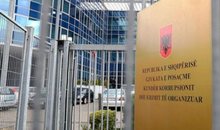

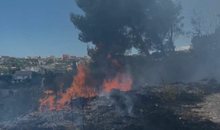
Fire in Lezha, flames near electrical substation
2025-07-10 13:32:24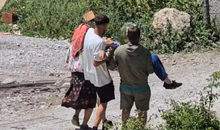
Residents clash with police in Theth, a woman faints
2025-07-10 13:24:38
"Rama and Xanun"
2025-07-10 13:15:46

Zodiac signs most likely to get divorced in July 2025
2025-07-10 12:45:51
A scapegoat for an illegitimate Republic
2025-07-10 12:35:02
"He has devastated his own nation"/ Berisha: Rama imprisons his opponents!
2025-07-10 12:26:54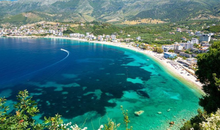

Albanian man injured with knife in Italy
2025-07-10 12:08:55






23-year-old in Mat drowned with rope, 4 suspects are being held
2025-07-10 10:58:53

After the dismissals, the new director of the Shkodra Police is appointed
2025-07-10 10:30:10
BIRN: Rama's action for public spaces, a repeated spectacle
2025-07-10 10:29:11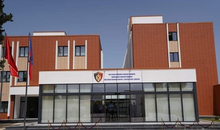
Action in Theth, Shkodra Police leaders dismissed
2025-07-10 10:16:28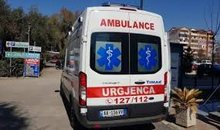
Fatal accident on the Tirana-Durres highway
2025-07-10 10:01:58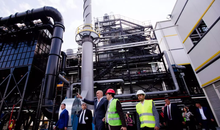
The incinerator does not exist, but the government continues to increase funds
2025-07-10 09:51:45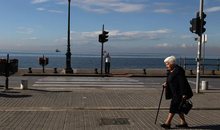
Albania is aging at a rapid pace! 30% of the population is over 60 years old
2025-07-10 09:46:23
End of an era, Modric says 'goodbye' to Real Madrid
2025-07-10 09:36:09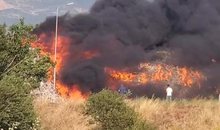
Mount Dukat has been on fire for 6 days, residents request air intervention
2025-07-10 09:27:24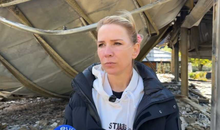

"Poverty on the rise"/ DW: Many people in Germany are not getting paid
2025-07-10 09:08:06
Horoscope, what do the stars have in store for you today?
2025-07-10 08:51:59


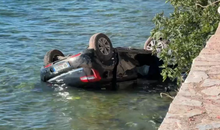

The scorching heat returns, the thermometer climbs to 40°C
2025-07-10 07:58:52
Morning Post/ In 2 lines: What mattered yesterday in Albania
2025-07-10 07:46:35
Tourist operator in Theth: They are demolishing our houses without warning
2025-07-09 22:54:57

Trump and Israeli commander warn: Gaza ceasefire could be near
2025-07-09 22:13:21
Fire in Elbasan Landfill, pedagogue: It is a cancer and environmental crime
2025-07-09 21:54:47


Dangerous summer, number of snake bites increases
2025-07-09 21:22:13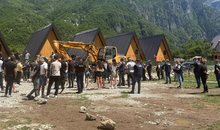
Berisha appeals again: Stop state terror against the residents of Theth!
2025-07-09 21:15:36
'Kissing disease' virus linked to several forms of cancer
2025-07-09 21:04:44
Malltezi confesses after release: Justice has become a political weapon
2025-07-09 20:51:48
Vokshi: Albania's EU integration has stalled due to lack of free elections
2025-07-09 20:37:21
